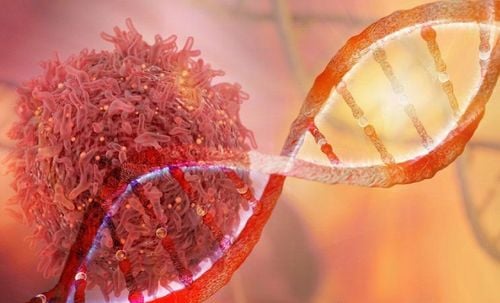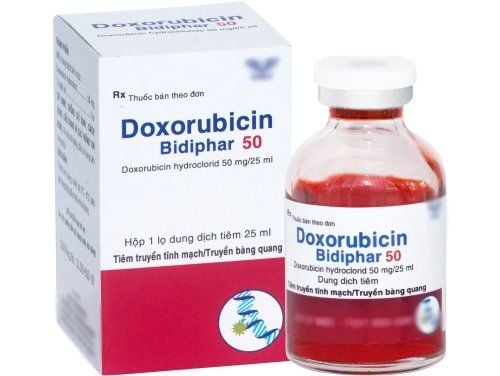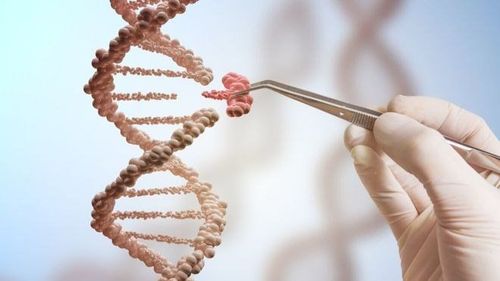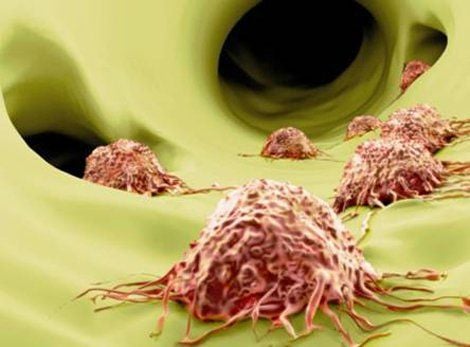This is an automatically translated article.
Genetic testing for cancer risk helps detect cancer-related gene changes that are passed down through generations in a family.1. What is genetic cancer testing?
Genetic cancer testing estimates a person's risk of getting cancer related to genes that run in the family. The mechanism of this test is to look for and detect specific abnormalities in a patient's genome, chromosome or protein. These abnormalities are called gene mutations.
Cancer genetic testing can be used to screen for several types of cancer, including:
Breast cancer Ovarian cancer Colon cancer Thyroid cancer Prostate cancer Pancreatic cancer Melanoma (Melanoma) Connective Tissue Cancer (Sarcoma) Kidney Cancer Stomach Cancer Gene testing aims to:
Predict the risk of a particular disease; Detecting a number of genes capable of inheriting offspring; Provide additional information to support the diagnosis.
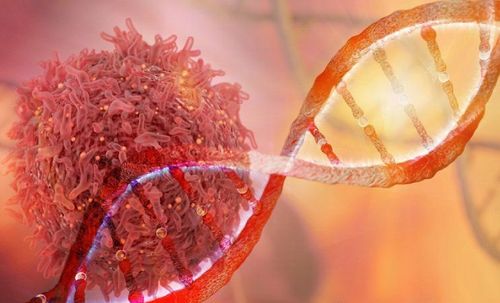
Genetic cancer testing only shows a person's risk of getting a certain type of cancer, but cannot determine if a patient definitely has cancer. The test results are meant to help doctors assess whether the genetic risk of cancer is high or low, which in turn can suggest patients to make better decisions for their future health needs.
On the other hand, only a certain percentage of people with genetic mutations will develop cancer. For example, a woman may have a 45% to 65% chance of developing breast cancer (due to a gene mutation detected). However, in the future, she may not get the disease.
Trắc nghiệm: Thử hiểu biết của bạn về bệnh ung thư
Ung thư là nguyên nhân gây tử vong hàng thứ 2 trên thế giới. Thử sức cùng bài trắc nghiệm sau đây sẽ giúp bạn có thêm kiến thức về yếu tố nguy cơ cũng như cách phòng ngừa bệnh ung thư.
Bài dịch từ: webmd.com
2. Genetic risk factors for cancer
Hereditary cancer is cancer caused by genetic mutations passed from parent to child in a family. The following factors increase the risk of cancer being passed on to future generations:
Family history of cancer: There are 3 or more people in the same family with the same or nearly identical forms of cancer; Childhood cancer: Two or more family members were diagnosed with cancer as a child. This risk factor can vary by type of cancer; Multiple cancers: When a family member is found to have 2 or more different types of cancer; Rare cancers: Certain types of cancer, such as ovarian cancer, adrenocortical cancer, or sarcoma, are linked to inherited genetic mutations.
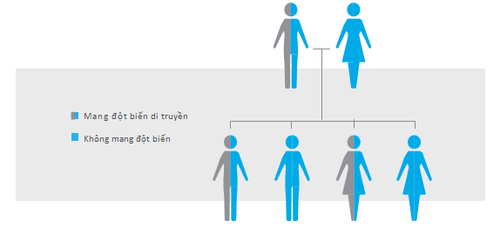
3. When to do genetic cancer testing?
Genetic cancer testing is ordered for different reasons after talking with family, doctors or genetic counselors.
Specifically, genetic testing should be considered in the following situations:
Personal history or another family member found that cancer is caused by an inherited gene mutation; The test results clearly show an abnormality in a certain genetic gene; Cancer genetic testing is needed to diagnose or monitor another disease. For example, the patient may have the test as a step in the treatment regimen to monitor postoperatively and assess the effectiveness of treatment.
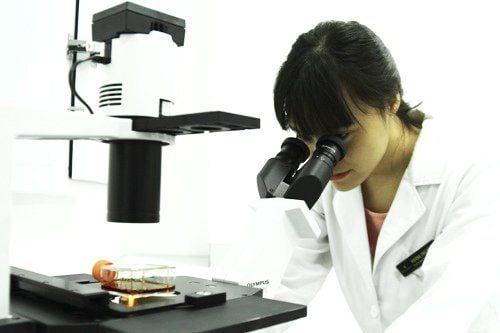
4. Other factors to consider before performing genetic testing
Genetic cancer genetic testing also has limitations and has important psychological and emotional implications, including:
Depression, anxiety or guilt A positive gene test result means There is a genetic mutation in the body. This can cause psychological instability. Some people, when they learn they have a genetic mutation, think they have the disease, even if they may never get cancer.
On the other hand, negative test results can sometimes lead to negative emotions. For example, some people feel guilty if they don't have a gene mutation while other family members have cancer.
Family stress People are generally encouraged to inform other family members about test results as this may be related to their health. However, this information can also complicate family situations and stress if the information is misleading.
Psychological subjectivity Genetic cancer test results are negative, meaning that the person taking the test does not have that particular type of gene mutation in the body. However, a negative result only means that the likelihood of cancer from inherited gene mutations may be low or absent, but cancer is still possible. In fact, each person's risk of cancer depends not only on genetics, but also influenced by many other factors, including lifestyle, chemical exposure, living environment and medical history .
Results are not positive Just because a genetic test for cancer is positive does not mean that the person will definitely have cancer. A gene can have a mutation that is not linked to cancer. Conversely, a person may have a genetic mutation that leads to cancer, but the test cannot find it. Furthermore, there are still many cancers that are inherited but are not associated with any particular gene mutation. Some genes can interact with other genes or environmental factors, leading to cancer. Therefore, the results of genetic testing are diagnostically significant, but cannot definitively conclude whether cancer has occurred or not.
High cost Genetic screening can be quite expensive if it is not covered by health insurance.
Discrimination and privacy Some people fear that they will be discriminated against after receiving genetic test results, others worry about the security of genetic information. The Genetic Information Nondiscrimination Act (GINA) was enacted to combat the use or disclosure of patients' genetic information, protecting them against discrimination related to genetic information. That way, if you have any questions about your test results or your genetic status, you can feel free to talk to your doctor.

5. Frequently asked questions about genetic cancer testing
Before having genetic cancer testing, you should learn and discuss with your doctor about the risks, limitations, and implications of the test results.
Here are some suggested questions:
Do I have a family history of cancer? Am I getting cancer at a younger age than average? How should I use the results of this genetic test? How will the test results affect my diagnosis and treatment and that of my family? The results show that I have a gene mutation, so can I reduce my cancer risk? Your doctor will fully answer these questions and provide advice on the risks and benefits of genetic cancer genetic testing. When receiving the test results, the doctor will advise and support the family to choose the most appropriate treatment plan.
Currently, Vinmec International General Hospital is the first medical facility in Vietnam capable of implementing cancer screening by combining 4 technologies: genetic testing, endoscopy, ultrasound and laboratory testing. immunity. In particular, cancer screening with genetic technology is a method that is considered a breakthrough in medicine.
Early screening is considered the "golden key" to detect and provide prevention methods, reduce the risk of death and costs for patients. Due to late detection (70% of patients are treated when they are at the end stage), the death rate from cancer in Vietnam is very high.
To learn more about screening methods and reduce the risk of developing hereditary cancer, you can contact Vinmec Health System nationwide, or register online HERE.
References: Cancer.net
MORE:
Testing for genetic mutations in the BRCA gene - How to reduce cancer risk? Hereditary cancer: Early screening is the "golden key" to escape death What you need to know about hereditary breast and ovarian cancer




